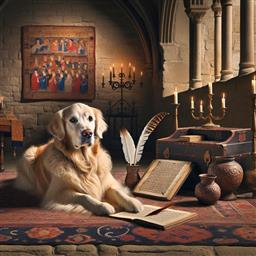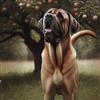14th Century Dog Names - Page 3
Updated: May 06, 2024
Welcome to an extraordinary page dedicated to the exploration of canine appellations from a distinctive era. As we journey back to a fascinating period of history, we delve into the rich tapestry of the 14th century. This was a time of monumental transformations, a time when the Renaissance was just beginning to dawn and the Middle Ages were slowly drawing to a close. The period not only witnessed significant changes in art, culture, and society, but it also saw a distinctive evolution in the naming conventions of our beloved four-legged companions.
As a dog lover, you might be intrigued to discover how our ancestors named their faithful hounds in this period. Dogs, being an integral part of human life for centuries, shared the same historical journey as their human companions. The names they were given often reflected the societal norms, cultural influences, and personal beliefs of the time. This page is dedicated to providing a unique collection of these names, offering an interesting perspective into the past. So, whether you're a history enthusiast, a dog lover, or just someone looking for an unusual name for your new pet, this page will definitely have something to captivate your interest.
These names not only carry a rich historical and cultural significance but also a distinctive charm and character. They stand out in their uniqueness, providing a refreshing alternative to the common names of today. As you explore further, you will find names that are truly reflective of the spirit of the 14th century. So, let's embark on this exciting journey into the past and discover the charm of these unique canine names.
| Name | Reason to Choose |
|---|---|
| Lionel | A strong and noble name in 14th Century France, great for a brave dog |
| Lucia | A beautiful Italian name from the 14th Century, perfect for a lovely and gentle dog |
| Ludwig | Ludwig was a common name among German nobility |
| Magnus | A common Scandinavian name |
| Margaret | The name of many queens and noblewomen of the era |
| Matilda | A popular name for queens and princesses in the 14th century, suitable for a regal canine |
| Merrick | A popular Welsh name in the 14th century, good for a dog with a strong personality |
| Milo | Derived from the Latin word for 'soldier' |
| Mungo | A unique Scottish name from the 14th Century, great for a unique and quirky dog |
| Nestor | Derived from Greek mythology, a common source for names |
| Nigel | A popular English name in the 14th Century, suitable for a friendly and social dog |
| Norbert | A popular German name in the 14th Century, perfect for a brave and loyal dog |
| Norman | Reflecting the influence of the Normans |
| Octavia | A noble Roman name from the 14th Century, suitable for a regal and elegant dog |
| Orion | Named after a giant huntsman in Greek mythology |
| Oscar | A popular name in the British Isles during the 14th century |
| Oswald | A strong and noble 14th Century English name, perfect for a strong and brave dog |
| Otto | A common name among German royalty |
| Pascal | Named after the Christian holiday of Easter, often celebrated in the 14th century |
| Percival | A knightly name from 14th Century England, great for a loyal and courageous dog |
| Philip | A name that means 'lover of horses' |
| Piers | The Middle English form of Peter |
| Prudence | A popular English name in the 14th Century, great for a wise and discerning dog |
| Quentin | Named after St. Quentin, a popular saint during the 14th century |
| Quincy | A distinguished French name from the 14th Century, suitable for a distinguished dog |
| Quintus | A name used by the Romans |
| Roger | Popular among the English nobility of the time |
| Roland | Famous from the epic poem The Song of Roland |
| Rosalind | A beautiful English name from the 14th Century, perfect for a lovely and gentle dog |
| Rudolf | A name that means 'famous wolf' |
|
Suggest:
|
Submitted!
|
| 1 2 3 4 5 | |
Religious Dog Names
| Name | Description |
|---|---|
| Ambrose | St. Ambrose was a prominent religious figure in the 14th century |
| Anselm | St. Anselm's philosophical works were well known in this era |
| Aquila | Aquila is Latin for 'Eagle,' a common symbol in religious iconography |
| Augustine | St. Augustine's philosophical teachings were influential in the 14th century |
| Basil | St. Basil the Great's teachings were widely read in this century |
| Benedict | Named after Pope Benedict XII, a 14th century pope |
| Bernard | St. Bernard of Clairvaux was a popular saint in the 14th century |
| Boniface | Boniface IX served as the pope in the late 14th century |
| Bridget | St. Bridget of Sweden was a notable religious figure in this era |
| Catherine | St. Catherine of Siena was a prominent religious figure in the 14th century |
| Clare | St. Clare of Assisi, a contemporary of St. Francis, was also well known in this period |
| Dante | Dante Alighieri, writer of the Divine Comedy, was a prominent figure in the 14th century |
| Dominic | Dominican Order was influential in the church during the 14th century |
| Francis | St. Francis of Assisi was canonized in the 13th century, his influence would still be felt in the next |
| Franciscan | The Franciscan Order was highly influential in the 14th century |
| Gregory | Gregory XI was another pope from this era |
| Hildegard | St. Hildegard of Bingen's writings were influential in this period |
| Innocent | Named after Pope Innocent VI, a 14th century pope |
| Jerome | St. Jerome's translations of the bible were widely used in this period |
| Johannes | Johannes Gutenberg, although more famous in the 15th century, was born at the end of the 14th century and changed religious print forever |
| Julian | Julian of Norwich was a well-known religious mystic from this time |
| Leo | Pope Leo the Great's writings were influential in the 14th century |
| Lucia | St. Lucia was a popular saint in the 14th century |
| Theodora | St. Theodora was venerated in this era |
| Thomas | St. Thomas Aquinas's teachings were particularly influential in this era |
|
Suggest:
|
Submitted!
|
Literary Dog Names
| Name | Description |
|---|---|
| Alighieri | Surname of Dante, an Italian poet |
| Beatrice | Dante's muse in 'Divine Comedy' |
| Boccaccio | Named after Giovanni Boccaccio, the author of 'Decameron' |
| Canterbury | In homage to Chaucer's 'Canterbury Tales' |
| Chanticleer | A rooster in 'Canterbury Tales' |
| Chaucer | In honour of Geoffrey Chaucer, a prominent English author in the 14th century |
| Cressida | English version of Criseyde from 'Troilus and Criseyde' |
| Criseyde | From Chaucer's 'Troilus and Criseyde' |
| Dante | In tribute to Dante Alighieri, the author of 'Divine Comedy' |
| Decameron | After Boccaccio's famous collection of novellas |
| Francesco | Named after Francesco Petrarch, a famous Italian scholar and poet |
| Giovanni | First name of Boccaccio, a 14th century Italian author |
| Inferno | First part of Dante's 'Divine Comedy' |
| Knight | A character from 'Canterbury Tales' |
| Miller | A character from 'Canterbury Tales' |
| Pandarus | A character from 'Troilus and Criseyde' |
| Paradiso | Final part of 'Divine Comedy' |
| Pardoner | A character from 'Canterbury Tales' |
| Petrarch | In honour of another name for Francesco Petrarch |
| Prioress | A character from 'Canterbury Tales' |
| Purgatorio | Second part of 'Divine Comedy' |
| Reeve | A character from 'Canterbury Tales' |
| Summoner | A character from 'Canterbury Tales' |
| Troilus | Derived from Chaucer's 'Troilus and Criseyde' |
| Virgil | Dante's guide in 'Divine Comedy' |
|
Suggest:
|
Submitted!
|
Medieval Dog Names
| Name | Description |
|---|---|
| Aldous | From the Old English 'Ealdwulf', meaning 'old wolf', a fitting name for a loyal, older dog |
| Algernon | From the Old English 'æþeling', meaning 'noble' |
| Baldwin | This name, meaning 'bold friend', was popular throughout the Middle Ages |
| Barnaby | A common medieval name, derived from the Old English 'beren', meaning 'to bear' or 'to carry' |
| Bertram | Meaning 'bright raven', it was a common male name in the 14th century |
| Bevis | This name, meaning 'bow strength', was popular throughout the Middle Ages |
| Constance | A popular female name in the 14th century, derived from the Latin 'constans', meaning 'constant, steadfast' |
| Cuthbert | Derived from the Old English 'cuth', meaning 'famous' and 'beorht', meaning 'bright' |
| Dunstan | This name, meaning 'dark stone', was popular throughout the Middle Ages |
| Eadric | This name, meaning 'wealthy ruler', was common during the 14th century |
| Edith | Edith was a popular female name throughout the Middle Ages |
| Egbert | This name means 'bright edge' in Old English |
| Elfrida | This female name, meaning 'elf strength', was common in the Middle Ages |
| Ethelred | In Old English, this name means 'noble counsel' |
| Giles | Giles was a popular name in the 14th century, derived from the Greek 'aigidion', meaning 'young goat' |
| Godric | Derived from the Old English elements 'god' and 'ric' meaning 'ruler' |
| Hilda | From the Old English 'hild', meaning 'battle' |
| Humphrey | A common name in the 14th century, derived from the Germanic elements 'hun', meaning 'bear cub', and 'frid', meaning 'peace' |
| Ivor | From the Old Norse 'Ívarr', meaning 'bow warrior' |
| Leofric | In Old English, this name means 'beloved ruler' |
| Maud | Maud was a common female name in the 14th century, derived from the Old German 'maht', meaning 'strength' |
| Mildred | A common female name in the 14th century, meaning 'gentle strength' |
| Osbert | Derived from the Old English 'Osbeorht', meaning 'godly bright' |
| Percival | Percival was a Knight of the Round Table in Arthurian legend |
| Winifred | A common female name in the 14th century, derived from the Old English 'wyn', meaning 'joy', and 'frith', meaning 'peace' |
|
Suggest:
|
Submitted!
|
Historical Figures Dog Names
| Name | Description |
|---|---|
| Beatrice | Reminiscent of Beatrice of Naples, a notable queen in the 14th century |
| Bernard | After Bernard of Clairvaux, a prominent churchman of this era |
| Boccaccio | Inspired by Giovanni Boccaccio, a famous Italian author |
| Catherine | A nod to Catherine of Valois, a significant 14th century queen |
| Chaucer | Inspired by Geoffrey Chaucer, the Father of English literature |
| Christine | A nod to Christine de Pizan, a notable writer and philosopher |
| Clement | Pope Clement VI was a significant religious figure in this era |
| Dante | Named after Dante Alighieri, the famous Italian poet |
| Edward | Several English kings in the 14th century bore this name |
| Eleanor | Commemorates Eleanor of Aquitaine, a strong female figure of this era |
| Giotto | Inspired by Giotto di Bondone, a renowned Italian painter |
| Gower | John Gower, a prominent English poet, inspires this name |
| Hawkwood | Named for Sir John Hawkwood, a notable English soldier |
| Henry | Named for King Henry IV of England, a 14th century monarch |
| Isabella | Honors Isabella of France, a queen known for her beauty and intelligence |
| Joan | Referencing Joan of Arc, a heroine of the 14th century |
| Julian | Honoring Julian of Norwich, a significant mystic and author |
| Langland | William Langland was a respected English poet |
| Louis | Honors Louis of Anjou, a 14th century French king |
| Margaret | Celebrates Margaret of France, a queen consort in this era |
| Ockham | Inspired by William of Ockham, an influential philosopher |
| Petrarch | Inspired by Francesco Petrarch, the Italian scholar |
| Philippa | A reference to Philippa of Hainault, queen consort of England |
| Richard | King Richard II of England ruled in this era |
| Wycliffe | Named after John Wycliffe, a notable theologian |
|
Suggest:
|
Submitted!
|
Royal Dog Names
| Name | Description |
|---|---|
| Agnes | In honor of Agnes Randolph, a prominent figure in 14th-century Scotland |
| Beatrice | Derived from Beatrice of Falkenburg, third wife of Richard I of England |
| Bertrand | After Bertrand du Guesclin, a well-known Breton knight of the 14th century |
| Blanche | Inspired by Blanche of Lancaster, the first wife of John of Gaunt |
| Edmund | In tribute to Edmund of Woodstock, 1st Earl of Kent in the 14th century |
| Edward | After Edward III of England, a significant ruler in the 14th century |
| Egidia | Inspired by Egidia de Lacy, a Scottish noblewoman in the 14th century |
| Eleanor | In honor of Eleanor of Aquitaine, a powerful figure in the Middle Ages |
| Geoffrey | Geoffrey Chaucer, prominent English poet of the 14th century |
| Guinevere | Pulled from the Queen consort of King Arthur |
| Henry | Named for Henry IV of England, a significant 14th-century monarch |
| Humphrey | After Humphrey de Bohun, 7th Earl of Hereford, a significant figure in the 14th century |
| Isabella | Influenced by Queen Isabella of France, known as the 'She-Wolf of France' |
| Joan | In honor of Joan of The Tower, first wife of David II of Scotland |
| Lancelot | A nod to Sir Lancelot, one of the knights in Arthurian legend |
| Margaret | Named for Margaret, Maid of Norway, a Queen of Scotland in the 14th century |
| Marguerite | Named for Marguerite of France, Queen of England and second wife of Edward I |
| Maud | After Maud, Countess of Leicester, a noblewoman in the 14th century |
| Percival | Inspired by the Arthurian knight known for his innocence and purity |
| Philippa | Taken from Philippa of Hainault, Queen of England in the 14th century |
| Richard | After Richard II of England, a prominent figure in 14th-century England |
| Robert | In tribute to Robert III of Scotland, a 14th-century king |
| Thomas | After Thomas of Woodstock, 1st Duke of Gloucester, and youngest son of Edward III |
| Tristan | Named after Sir Tristan, a knight of the Round Table in Arthurian legend |
| Walter | In honor of Walter Stewart, 6th High Steward of Scotland, a prominent figure in the 14th century |
|
Suggest:
|
Submitted!
|
User Submitted Images
There are currently no user submitted images for this page. This is your opportunity to be the first! Submit your photo below.
User Recommendations
There are currently no name recommendations for this page. This is your opportunity to be the first! Make your recommendation below.
Recently Updated
We would like to take this time to thank all of our visitors that make DogNamed.com the best dog naming resource on the web. Our site would not be where it is today without your suggestions, ratings, and photo submissions. So pat yourselves on the back for a job well done and keep up the good work! If you have any comments, suggestions, or ideas for the this page or any part of our site, don't hesitate to drop us a line on our Contact Page. Thank you! -The DogNamed Team




























